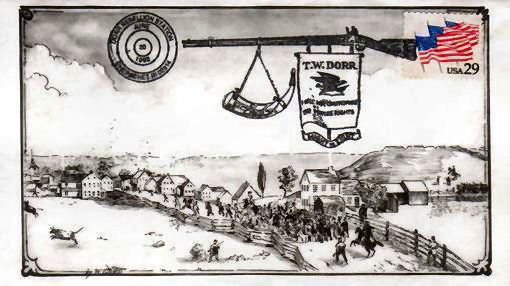![]()
Postal History Introduction
Stampless
Covers
1846
to 1900 Issues
1901-1950
Issues
1951-2003
Issues
Cancels
&
Miscellaneous
Postal
Stationery
Post
Cards
Air
Mail
First
Day &
Event Covers
Parcel Post/Special Delivery
Registered & Official Mail
Commercial & Advertising
Revenue & Postage Due
Wildlife & Game Issues
Complete List of RI Issues
|
Rhode Island
Illustrated Event Covers |
|
|
|
|
The Dorr rebellion of 1842 was directed against the government of Rhode Island which was still operating under the charter of 1663. Under the 1663 charter, only freeholders, (land owners of at least $134 value in land) and their eldest sons had the right to vote. Thomas Wilson Door, the son of an aristocratic Rhode Island family was born in Providence, Rhode Island on November 5, 1805. As a member of the Rhode Island State Legislature from 1834 to 1841, Dorr had attempted unsuccessfully to change the state's charter to universal suffrage. In 1841 Dorr organized the People's Party, which then adopted a constitution favoring universal suffrage. In a popular election held under this constitution, Dorr was elected governor in 1842, however the election was not accepted as legal by the legislature or the State Supreme Court. Governor Samuel King was returned to office in a separate election under the old constitution at which point, Dorr and his followers marched on Providence and attempted unsuccessfully to seize the state arsenal in Providence on May 18, 1842. Most of Dorr's followers then deserted and he was forced to flee the state. Dorr returned to Chepachet, RI in June and attempted to reconvene his People's Legislature, but in the meantime Governor King had declared martial law, indicted Dorr for High Treason and sent a Law and Order army of 2500 to quash the rebellion and arrest the Dorrites. Dorr was forced to flee once again. Note: A suit arising from the conflict reached the United States Supreme Court, however the Court evaded the issue as to which of Rhode Island's governors was legitimate. Chief Justice Roger B. Taney's (author of the infamous Dread Scott Decision), opinion said that the President and Congress must make that decision. He also stated that the existing state authority, (the conservative government) was legally empowered to use martial law in the face of a violent insurrection. The conservatives under Governor King finally convinced of the strength of Dorr's cause, called for another convention in 1843. The convention adopted a new constitution, which greatly liberalized the voting requirements and which was accepted by both parties. Door returned to the state, was found guilty of High Treason and sentenced to solitary confinement at hard labor for life in 1844. Dorr served one year and was released in 1845, however by this time he was broken in both health and spirit and was not involved in any further political activity. In 1854 the court judgment against him was reversed. It was however, the mid-twentieth century before full rights to vote in all elections was extended to all Rhode Island citizens. Sources: |
![]()
RI Historical
Society
The Post Offices
Home Page
RI Tercentenary Issue History
RI Philatelic Society
Recently Added Pages
Philatelic Primer
Rhode Island Around the World
Rhode Island
Town Postmarks
Other Websites of Interest
